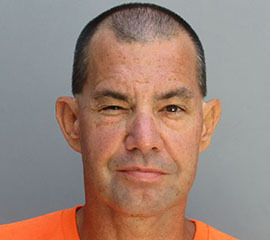- Slug: BC-CNS-Gunches Execution,1010.
- 2 file photos available (thumbnails, captions below)
By Alexis Waiss
Cronkite News
WASHINGTON – The Arizona Supreme Court on Thursday ordered the execution of death-row inmate Aaron Gunches, even though state officials were moving to reverse the death warrant that had been put in motion by former Attorney General Mark Brnovich.
Gunches, convicted in a 2002 Mesa murder, had waived all his appeals since 2007 and actually petitioned the court last year to sign his death warrant. But he reversed course with the election last fall of a new governor and attorney general who said they planned to pause executions in the state.
In his Jan. 4 motion to withdraw his death warrant, Gunches cited recent executions, noting that corrections staff “on the execution team are not medical professionals, nor are they certified for IV insertion, nor are they capable of performing surgery. Plain and simple: This was torture. Aaron Gunches does not want to be tortured before he is executed.”
His case appeared to get a boost on Jan. 20, when Attorney General Kris Mayes filed a motion to withdraw the death warrant, saying her office needed to ensure that “the public can be confident that executions are being carried out lawfully and humanely.” That same day, Gov. Katie Hobbs issued an executive order appointing a commissioner to review the Arizona Department of Corrections, Rehabilitation and Reentry’s execution procedures and recommend ways to make them safer and more accountable.
But the court Thursday said it’s hands were tied: Once a death warrant request has been filed, the only question for the court is whether Gunches meets the criteria for execution. He did, the court said, and nothing in Gunches’ or the state’s filings suggested otherwise.
“If those criteria are met, under statute and rule the Court ‘shall’ and ‘must’ issue the warrant,” the order said. “As the state has placed the Court on notice that the criteria are satisfied, and no party having asserted otherwise, the Court’s duty is to issue the warrant that authorizes the execution.”
The court set April 6 as the date for Gunches’ execution by lethal injection.
Mayes’ office declined to comment on the order Thursday. A spokesperson for Hobbs said the office will review the ruling before deciding what steps to take.
“This is a serious matter that we do not take lightly,” the spokesperson said in a prepared statement. “We’ll be consulting with counsel to evaluate how to proceed.”
Gunches has been on death row since 2008, six years after he shot and killed his girlfriend’s ex-husband, Ted Price, execution-style on the Salt River Reservation, shooting him three times in the chest and once in the back of the head.
A month later, in January 2003, Gunches was stopped by an Arizona Department of Public Safety officer. He shot the officer twice, one shot striking the officer’s bulletproof vest and the other deflecting off his watch. After his arrest, authorities matched the gun from the officer’s shooting to the one that killed Price.
Price’s sister, Karen, said in court filings that Gunches’ execution should be carried out because she and her family “have the right to justice and finality.”
“The constitutional guarantees of ‘justice’ and a ‘prompt and final conclusion’ of this case remain unfulfilled promises to Ms. Price and her family,” her attorneys wrote, according to news reports. “They deserve a life after the criminal case is final, one in which they are no longer wondering whether there really ever will be justice.”
Arizona had halted executions in 2014, when it took two hours to kill death-row inmate Joseph Wood by lethal injection. But Brnovich said in 2019 that issues with the death penalty had been resolved and that it was time to resume executions for those death-row inmates who had exhausted their appeals.
Executions resumed last year, when the state put three inmates to death. When Gunches asked the state on Nov. 25 to issue his death warrant, Brnovich agreed in filings on Dec. 7 – a month after the election of Mayes.
Despite Brnovich’s assurances, Joshua Spears of the American Civil Liberties Union of Arizona said there are still many questions about the drugs used in executions and the qualifications of those involved.
He said Wood’s execution “was pretty horrific to watch, according to witnesses, and it caused national embarrassment. It caused us to pause executions for eight years and we are at risk of botching another one until we have more transparency.”
“They (executions) do not go exactly as they’re supposed to go. And those issues create questions for us,” Spears said. “If they’re having problems that we can see, what’s going on behind the scenes? What is the qualification of the executioners if they’re having trouble carrying out the executions in the manner they’re supposed to?”
Richard Dieter, executive director of the Death Penalty Information Center, said Gunches could ask for clemency, but governors are often hesitant to grant clemency “because it’s an all or nothing thing.”
“(You can) challenge your sentence, you can challenge your conviction, you can challenge the way you’re going to be executed, all those things,” Dieter said. “If the clemency is granted, that’s pretty much, it’s over.”
Dale Baich, a former federal public defender who now teaches at Arizona State University’s Sandra Day O’Connor College of Law, called Gunches’ case “a unique situation.” But he said the decision itself was clear.
“The rules are very specific, the statute and the rules are very specific. And as you read you see where they say, ‘We must, we shall,'” Baich said. “The court was dismissive of the concerns that the attorney general raised, and that Aaron raised, quite frankly, about problems with recent executions in Arizona.”
Dieter said capital punishment is “a largely political process” rather than “part of the criminal justice system.”
“The death penalty gets one side, the toughness on crime, and the other side, it’s a failed system that needs to be studied and used, if at all, with great caution,” Dieter said. “You get an election and all of a sudden, the death penalty becomes prominent or the death penalty recedes into the background.”
For more stories from Cronkite News, visit cronkitenews.azpbs.org.
^__=
Web links:
_ Court order: https://www.scribd.com/document/629058000/Arizona-Supreme-Court-Order-on-Gunches-Execution
_ Gunches’ withdrawal request: https://www.scribd.com/document/629058470/Gunches-Motion-to-Withdraw-Death-Warrant
_ Mayes’ withdrawal motion: https://mcusercontent.com/cc1fad182b6d6f8b1e352e206/files/31f7c492-65ef-61e1-6567-b85ed48a6cc0/Motion_to_Withdraw_Motion_for_Warrant_of_Execution.pdf
_ Mayes’ statement: https://www.azag.gov/press-release/arizona-attorney-generals-office-files-motion-withdraw-execution-aaron-brian-gunches
_ Brnovich petition: https://www.azag.gov/sites/default/files/docs/press-releases/2022/motions/Response%20to%20Motion%20for%20Warrant.pdf
_ Brnovich statement: https://www.azag.gov/press-release/ago-requests-warrant-execution-death-row-inmate-aaron-gunches
_ Brnovich 2019 letter: https://www.azag.gov/sites/default/files/2019-07/19-07-26_AG_ltr_to_Gov_re_Death_Penalty.pdf
_ Hobbs’ executive order: https://mcusercontent.com/cc1fad182b6d6f8b1e352e206/files/56c718e8-c978-4cbc-399e-62c9870513dd/Exhibit_to_Motion_to_Withdraw.pdf
_ Price filing: https://www.12news.com/article/news/local/arizona/arizona-inmate-asked-executed-changed-mind-brnovich-mayes/75-797255d7-0bd0-4075-99c1-7c70e37d6698
_ ACLU statement: https://www.aclu.org/press-releases/aclu-of-arizona-amicus-supports-withdrawal-of-arizona-death-warrant
_ 2022 executions: https://corrections.az.gov/death-row/last-meals-request
^__=
After an eight-year hiatus, Arizona executed three inmates by lethal injection in 2022. The Arizona Supreme Court on Thursday set an April 6 execution date for convicted murderer Aaron Gunches. (Photo courtesy Arizona Department of Corrections, Rehabilitation and Reentry)
Aaron Brian Gunches, who pleaded guilty to a 2002 execution-style murder, had asked the state to issue his death warrant, then changed his mind. (Photo courtesy Arizona Department of Corrections, Rehabilitation and Reentry)

